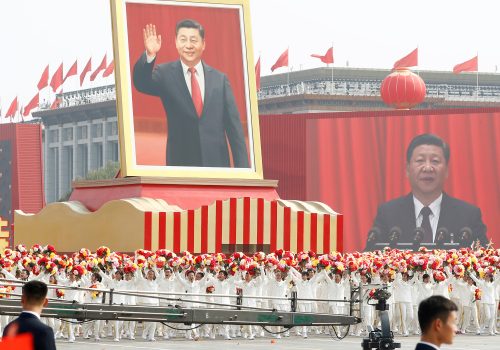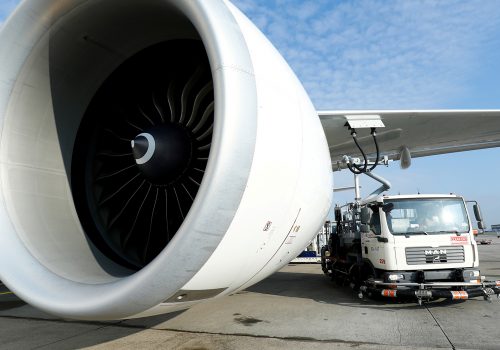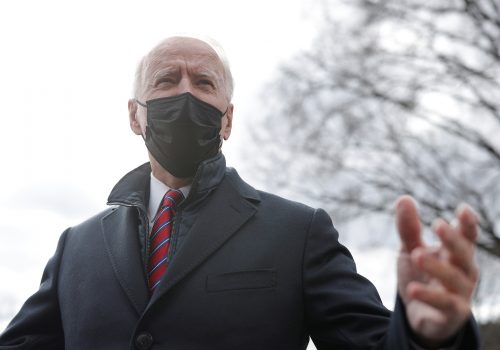The future is here: A guide to the post-COVID world 02/05/2021
Welcome to your guide to where the world is headed during the pandemic era and beyond. Each week, we’ll bring you the latest and most significant expert insights and international news about how coronavirus is reshaping international affairs. To stay updated each week, sign up to the newsletter here.
Let’s take a spin around the globe, in seven minutes or less.
In top stories this week:
- The number of COVID-19 vaccinations may have exceeded infections worldwide, but there are still hurdles ahead—including new variants.
- In the race toward economic recovery, Europe is lagging behind the United States and China.
- The Olympics is borrowing from golf etiquette for its pandemic planning: Clapping will be allowed but chanting will be discouraged.
- But first…
The big story
This week’s key theme: The geopolitics of Russia’s COVID-19 vaccine
Russia’s Sputnik V vaccine is nearly 92 percent effective in fighting COVID-19, the international medical journal The Lancet reports.
The news may have justified, to some extent, Moscow’s decision to roll out the vaccine before the release of final data, according to Reuters. But there are also some intriguing geopolitical implications. For one, as Defense One puts it, the development presents Western governments with a dilemma: how to celebrate the emergence of another promising vaccine without normalizing shortcut methods.
The leaders of some countries are defending their decisions to purchase the Russian vaccine despite its early release. “The world has hit an iceberg, like the Titanic, and the rich and the richest only save themselves and their loved ones,” the Financial Times cites Serbian President Aleksandar Vucic as saying in late January, in justifying his decision to buy Russian and Chinese vaccines even as the country negotiated contracts for vaccines approved by the European Union (EU). As Hungary’s first shipment of the Russian vaccine arrived, Foreign Minister Peter Szijjarto lambasted the EU for its sluggish vaccination program.
Fifteen countries—from Argentina to the United Arab Emirates—have so far approved Sputnik V, according to Russia’s sovereign wealth fund. It’s a “geopolitical coup” for Moscow, The Wall Street Journal says, as well as potentially a slice of the global multi-billion dollar market. The price, at less than ten dollars a shot, could make it popular in developing countries. Many of these countries, however, are depending on World Health Organization (WHO) vetting of vaccines, and Russia’s vaccine is still awaiting WHO authorization.
And it’s not all smooth sailing. Health professionals and legislators in Iran criticized the government’s decision to import the Russian vaccine, arguing that it’s not been approved by international bodies yet and that the government’s motives to choose the Sputnik shot were political.
And even as Sputnik V is set to join the global arsenal against the pandemic, Russian authorities still need to win over the Russian public: Fewer than four in ten Russians are ready to take the shot, Bloomberg says, citing a poll in late December by the Levada Center
Subscribe to The future is here: A guide to the post-COVID world
Sign up for a weekly roundup of top expert insights and international news about how coronavirus is reshaping international affairs.

The world in brief
Insights from across the planet, in ten bullets or fewer
- Vaccine shots have surpassed COVID-19 cases worldwide. The number of COVID-19 vaccinations globally has reached 105 million, versus 103.5 million infections, the Financial Times reports, citing its own tracker (while flagging the limitations of the statistics). Vaccines will soon have a big impact on the transmission rate of infections, at least in wealthy economies, as billions of doses become available in the coming months. But challenges are appearing ahead in the form of new variants of the virus and hesitancy about taking the vaccine especially among young adults, it adds.
- The numbers (also) say: Bloomberg puts the number of inoculations so far at 119 million, with the news outlet saying it’s built the biggest database to track vaccine progress. Israel is heading for 75 percent coverage in only two months, while the United States will reach that milestone by 2022. (North Dakota may be six months ahead of Texas.) At current rates worldwide, life will be back to normal in… seven years.
- QUOTE: “The moment I become a sole encourager of the vaccine, of taking the vaccine, I lose my credibility, because then, ‘He is no longer looking out for us, he’s looking out for industry, he’s looking out for researchers, he’s looking out for the government, he’s looking out for pharmaceutical [companies],’” says Terris King, a pastor in Baltimore who is working to overcome vaccine hesitancy in his own congregation, news service Stat reports. He wants to bring “a community facts, and [to have] the trust that they have the intelligence to make their own decision.”
- Europe’s economic rebound is trailing those of China and the United States. Extensive pandemic restrictions, a stubbornly high level of infections, and a vaccine rollout mired in delays have resulted in economic recovery in the Eurozone lagging behind that of the United States and China, with the gap set to widen this year, The Wall Street Journal reports. The bloc’s 6.8 percent drop in GDP last year compares with a decline of 3.5 percent in the United States, while China’s economy grew by about 2.3 percent.
- QUOTE: “Inequitable distribution of vaccines risks exacerbating financial vulnerabilities, especially for frontier market economies,” the IMF wrote, according to the Financial Times.
- What a shipping company has to say about governments’ plans to distribute vaccines. Governments have failed in their plans to deliver COVID-19 vaccines, with distribution delays caused by a lack of local storage and delivery solutions, Deutsche Post DHL CEO Frank Appel tells the Financial Times. Appel, also a former neurobiologist, says infrastructure to keep the Pfizer/BioNTech vaccine at super-cold temperatures could easily be built in big parking lots. “It’s not rocket science,” he says.
- Africa’s second COVID-19 wave is here. At least forty countries in southern Africa are experiencing a second wave of infections, the BBC reports, citing the Africa Centres for Disease Control and Prevention. While new cases have fallen in some other African countries, infection levels are persistently high elsewhere and many cases are suspected to be linked to new variants, the broadcaster adds.
- COVAX has set out vaccine plan for emerging markets. The United Nations-backed COVAX Facility plans to distribute one hundred million doses of COVID-19 vaccine by the end of March, and two hundred million more by July, to the world’s neediest people, The Associated Press reports. Almost all doses will be supplied by AstraZeneca and its partner, the Serum Institute of India.
- Normality is still years away. Life, at least in the United Kingdom, will not get back to normal until populations worldwide get a COVID-19 vaccine, the Mirror newspaper reports, citing Dr. Clare Wenham, assistant professor of global health policy at London School of Economics. Even once the UK population has been vaccinated, Sky News reports, border controls will remain in place to curb the possibility of resistant coronavirus variants spreading internationally. While some countries including the United Kingdom and Israel have made progress in mass vaccinations, others remain a long way away from that, the Mirror adds.
- QUOTE: “At the moment, the data is showing it’s going to be 2023/24 before the global vaccines are distributed to everybody,” Wenham told Sky News. “That’s a long time. And distributing some now might be able to get us back to normal life sooner.”
- Hush now, it’s the Olympics. Singing and chanting will be discouraged, but clapping to cheer on athletes in Tokyo this summer will be allowed, according to the International Olympic Committee’s plan to prevent COVID-19 infections, the Irish Independent reports. That’s among the measures outlined by organizers in the first playbook of guidelines.
The inside scoop
Insights from the Atlantic Council



